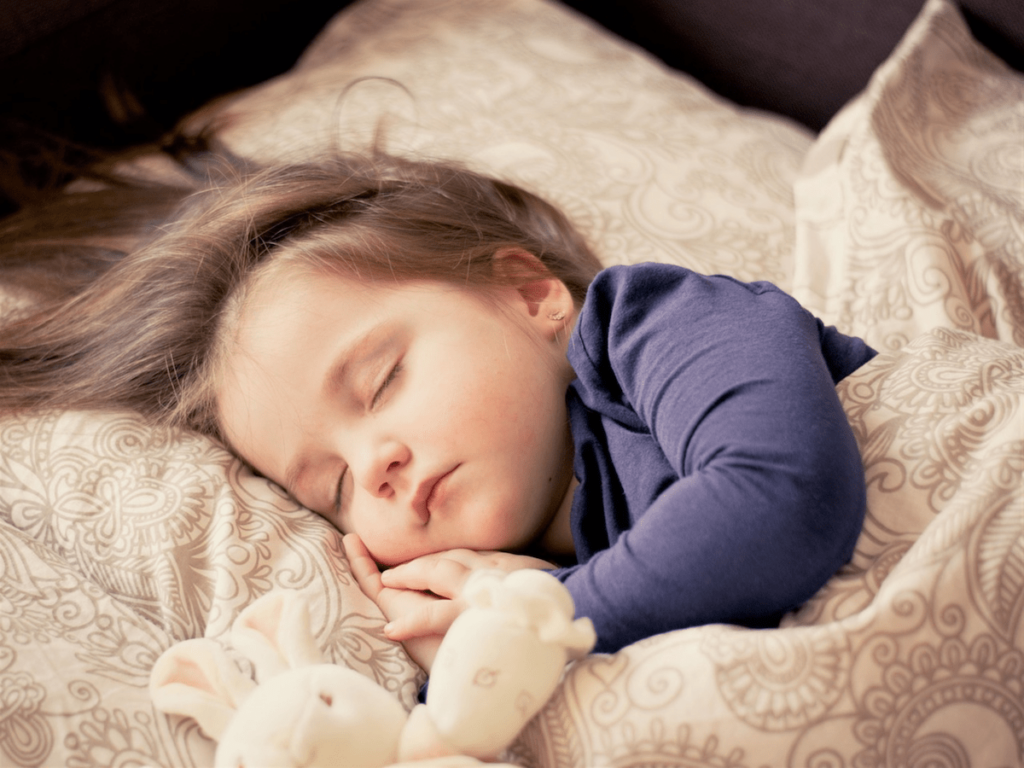Children are bundles of vitality. Throughout the years, kids experience sleeplessness, longer hours spent awake, and the occasional naptime, too. Yet, all parents can relate to the struggle of hearing, “Just one more bedtime story!” Or, “I can’t sleep. Can I sleep with you?”
Getting the kids to sleep fast does not have to be a nightmare. Here are ten tips to get the kids to fall asleep faster.
1. Individualized bed and wake times
Everyone is different, as we all come to know sooner or later. Depending on the age of your kid(s), they may need more or less sleep than other members of the household.
As long as your school-age youngster is getting 9-12 hours of sleep, they are getting enough. Just remember that an early bird is always going to get up early, no matter when they go to sleep. Same with night owls. Therefore, you need to make a schedule that works for them and stick to it.
Also, wake time should be enforced. No sleeping in on the weekends, as that actually makes it harder for them to fall asleep at the beginning of the school week.
2. No TV 2 hours before bed
Or any electronics, for that matter. Research has consistently proven that blue light from electronic devices, like the iPad, the TV, and the PC all stimulate the brain to feel more awake. Kids are twice as susceptible to this as adults.
So the TV and all electronic devices need to be put away at least 2 hours before bed. If you do not know what to do for those next 2 hours, try reading the stories to them, playing with dolls or action figures, listening to music, or doing some relaxing bedtime yoga.
3. Calm environment
One thing that will keep kids awake is an overload of stress (and the hormone responsible for it, cortisol). This plays into loud noises coming from the television or anything that can get your little one’s heart racing.
Be sure their room is cozy and full of things that make them feel calm – cool sheets, black-out curtains, and therapeutic scents. Try to keep volume low throughout the rest of the house when they are dozing.
4. Transitional objects
For kids that used to be rocked to sleep or laid beside their parents, letting go of that proximity is going to be hard for them and can cause stress. In fact, it may even cause a sleep-onset association disorder. That is why a transitional object can help them get to sleep.
These objects are anything from stuffed animals, teddy bears, blankets, to nightlights. Hugging on a stuffed animal or teddy bear has been proven to reduce nighttime anxiety throughout life. So if your child is having a difficult time sleeping alone, consider getting them a special friend.
Read also – 5 Little Things Helicopter Parents Do Differently
5. Comfortable temperature
Light is not the only thing that can keep a child awake. Sleep cycles are also linked to temperature. Melatonin, the chemical that is produced to promote deeper sleep, actually lowers body temperature.
To avoid pumping up the heat too high. Normal room temperature is just right. If your child does complain of being cold, simply offering them a warmer blanket will help.
6. Overcome fears
Some kids are afraid of the dark or what lurks underneath the bed. Incorporate overcoming fears into the bedtime routine for as long as you need to. This includes telling them that their stuffed animal will protect them, giving them an incandescent nightlight, or even doing things like checking the closet or looking under the bed to make sure nothing is there. Some parents may even use aromatherapy spray and call it “monster repellant.”
7. Consistency
As you can see by now, a routine is a big deal for raising kids. This means having them go to sleep at the same time every single night and wake up the same time every single morning.
It also means doing the same things before bedtime, such as calming activities, baths, tooth-brushing, and the like. As your child gets older, throwing in a late-night movie once in a while will not be an issue, but keep occasions like that rare until they are into the adolescent years.
8. Bed is for sleep
One thing that causes insomnia in children and adults is using the bed for more than just sleep and…adult things. For kids, that means they should be using their bed as a sofa, trampoline, dining area, or work station. Doing other activities aside from sleeping in bed disassociates the brain from thinking “going to bed” means sleep.
9. No stimulants
Giving your child anything with high sugar or caffeine before bed is a recipe for sleepless nights and crashing furniture. That means cutting out coffee, tea, sports drinks, soda, candy, and other junk food at least 3 hours before bedtime.
If your child wants or needs a late-night snack, make sure it is a healthy food that promotes sleep, like cherry juice, which contains melatonin, or unsweetened corn flakes and milk.
10. Limit extracurricular activities
If your kids are staying out late doing dance, soccer, martial arts, or other practices for extracurricular activities, then it may be time to rethink just how much they are doing.
Too much activity before bedtime is not going to tire them out, because their bodies will still be primed for activity and very much awake. Try to have a cut-off point so they can come home, relax, and settle down for some quality rest.
Read also – 5 Things I Gave Up for Motherhood Without Regret
These ten ways to get your kids to sleep fast will come in handy, especially if your little one is proving to be an insomniac. Take a good look at the routine you have now to see what could be factoring into your child’s sleeplessness.
Try taking away stimulants, giving them a stuffed animal, and making sure the room is dark and comfortable. When that is done, quality shut-eye for everyone is guaranteed.

